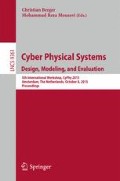Abstract
In model-based analysis of energy consumption behavior, detecting energy bugs is formulated as a model checking problem. Model checkers can check the energy consumption behavior automatically, but significant manual effort is required to study the generated counter-example trace for finding the root causes of the failure. This effort can be reduced by using a formula-based automatic fault localization method. The present paper proposes a new trace formula, encoding all potential transition sequences, with modest assumptions on the failure. The paper also discusses the precision of the identified root causes and limitations of the adapted failure model.
Access this chapter
Tax calculation will be finalised at checkout
Purchases are for personal use only
Notes
- 1.
We can assume here the counter-example trace is free from the \(\delta \)-stuttering issue.
References
Android. http://developer.android.com
IEEE Standard 802.11, Wireless LAN Medium Access Control (MAC) and Physical Layer (PHY) Specifications (1999)
Alur, R., Courcoubetis, C., Henzinger, T.A.: Computing accumulated delays in real-time systems. CAV 1993. LNCS, vol. 697, pp. 181–193. Springer, Heidelberg (1993)
Alur, R., Dill, D.L.: A theory of timed automata. TCS 126, 183–235 (1994)
Alur, R., Courcoubetis, C., Halbwachs, N., Henzinger, T.A., Ho, P.-H., Nicollin, X., Olivero, A., Sifakis, J., Yovine, S.: The algorithmic analysis of hybrid systems. Theoret. Comput. Sci 138, 3–24 (1995)
Biere, A., Cimatti, A., Clarke, E., Zhu, Y.: Symbolic model checking without BDDs. In: Cleaveland, W.R. (ed.) TACAS 1999. LNCS, vol. 1579, pp. 193–207. Springer, Heidelberg (1999)
Biere, A., Heule, M., Van Maaren, H., Walsh, T. (eds.): Handbook of Satisfiability. IOS Press, Amsterdam (2009)
Brekling, A., Hansen, M.R., Madsen, J.: MoVES - a framework for modeling and verifying embedded systems. In: Proceedings of the ICM2009, pp. 149–152 (2009)
Christ, J., Ermis, E., Schäf, M., Wies, T.: Flow-sensitive fault localization. In: Giacobazzi, R., Berdine, J., Mastroeni, I. (eds.) VMCAI 2013. LNCS, vol. 7737, pp. 189–208. Springer, Heidelberg (2013)
Dutertre, B., de Moura, L.: The Yices SMT Solver (2006). http://yices.csl.sri.com
Jose, M., Majumdar, R.: Cause clue clauses: error localization using maximum satisfiability. In: Proceedings of the PLDI 2011, pp. 437–446 (2011)
Lamraoui, S.-M., Nakajima, S.: A formula-based approach for automatic fault localization of imperative programs. In: Merz, S., Pang, J. (eds.) ICFEM 2014. LNCS, vol. 8829, pp. 251–266. Springer, Heidelberg (2014)
Liffiton, M.H., Sakallah, K.A.: On finding all minimally unsatisfiable subformulas. In: Bacchus, F., Walsh, T. (eds.) SAT 2005. LNCS, vol. 3569, pp. 173–186. Springer, Heidelberg (2005)
Liffiton, M.H., Sakallah, K.A.: Algorithms for computing minimal unsatisfiable subsets of constraints. J. Autom. Reasoning 40(1), 1–33 (2008)
Liffiton, M.H., Malik, A.: Enumerating infeasibility: finding multiple MUSes quickly. In: Gomes, C., Sellmann, M. (eds.) CPAIOR 2013. LNCS, vol. 7874, pp. 160–175. Springer, Heidelberg (2013)
Morgado, A., Liffiton, M., Marques-Silva, J.: MaxSAT-based MCS enumeration. In: Biere, A., Nahir, A., Vos, T. (eds.) HVC. LNCS, vol. 7857, pp. 86–101. Springer, Heidelberg (2013)
Nakajima, S.: Model-based power consumption analysis of smartphone applications. In: Proceedings of the ACES-MB 2013, pp. 5:1–5:10 (2013)
Nakajima, S.: Everlasting challenges with the OBJ language family. In: Iida, S., Meseguer, J., Ogata, K. (eds.) Specification, Algebra, and Software. LNCS, vol. 8373, pp. 478–493. Springer, Heidelberg (2014)
Nakajima, S.: Model checking of energy consumption behavior. In: Cardin, M.-A., Krob, D., Lui, P.C., Tan, Y.H., Wood, K. (eds.) Proceedings of the 1st CSDM Asia, pp. 3–14. Springer, Switzerland (2014)
Nakajima, S.: Using real-time maude to model check energy consumption behavior. In: Bjørner, N., de Boer, F. (eds.) FM 2015. LNCS, vol. 9109, pp. 378–394. Springer, Heidelberg (2015)
Nakajima, S.: Formal analysis of android application behavior with real-time maude. In: Proceedings of the CPSNA 2015, pp. 7–12 (2015)
Pathak, A., Hu, Y.C., Zhang, M.: Bootstrapping energy debugging on smartphones: a first look at energy bugs in mobile devices. In: Proceedings of the Hotnets 2011, pp. 5:1–5:6 (2011)
Reiter, R.: A theory of diagnosis from first principles. Artif. Intell. 32(1), 57–95 (1987)
Safarpour, S., Mangassarian, H., Veneris, A., Liffiton, M.H., Sakallah, K.A.: Improved design debugging using maximum satisfiability. In: Proceedings of the FMCAD 2007, pp. 13–19 (2007)
Sorea, M.: Bounded model checking for timed automata. ENTCS 68(5), 116–134 (2002)
Wotawa, F., Nica, M., Moraru, I.: Automated debugging based on a constraint model of the program and a test case. J. Logic Algebraic Program. 81(4), 390–407 (2012)
Acknowledgements
This work is partially supported by JSPS KAKENHI Grant Numbers 24300010 and 26330095, and the Kayamori Foundation of Informational Science Advancement.
Author information
Authors and Affiliations
Corresponding author
Editor information
Editors and Affiliations
Rights and permissions
Copyright information
© 2015 Springer International Publishing Switzerland
About this paper
Cite this paper
Nakajima, S., Lamraoui, SM. (2015). Fault Localization of Energy Consumption Behavior Using Maximum Satisfiability. In: Mousavi, M., Berger, C. (eds) Cyber Physical Systems. Design, Modeling, and Evaluation. CyPhy 2015. Lecture Notes in Computer Science(), vol 9361. Springer, Cham. https://doi.org/10.1007/978-3-319-25141-7_8
Download citation
DOI: https://doi.org/10.1007/978-3-319-25141-7_8
Published:
Publisher Name: Springer, Cham
Print ISBN: 978-3-319-25140-0
Online ISBN: 978-3-319-25141-7
eBook Packages: Computer ScienceComputer Science (R0)

